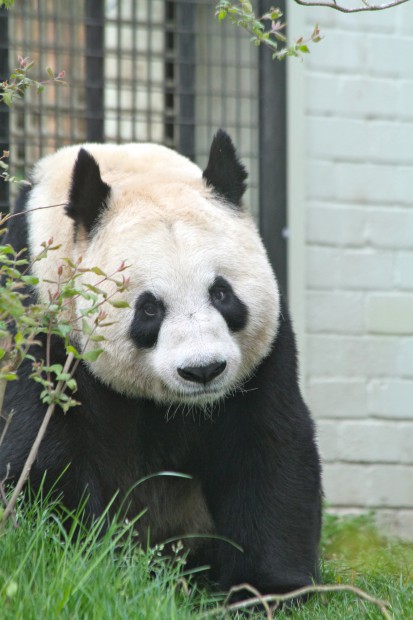AI @ Edinburgh Zoo
The Royal Zoological Society of Scotland (RZSS) can confirm that artificial insemination was carried out on female giant panda Tian Tian on the afternoon of Sunday 13 April. Introductions between the pair were attempted but unsuccessful.
Iain Valentine, Director of Giant Pandas for RZSS, said:
“Although it often varies from year to year and from panda to panda, this spring Tian Tian came into oestrus 13 days after the crucial hormone crossover, whilst last year she took us to day 14.
“From the start, when the pandas started to show breeding behaviour early this spring, both were showing very positive signs. We were hopeful natural mating would occur this year, but in the end Tian Tian’s hormones started to fall quickly which meant her breeding window could be much shorter. Although our Chinese expert Doctor Wang Chengdong, from the China Conservation and Research Centre for Giant Pandas (CCRCGP), was confident the pair would mate naturally, after the first unsuccessful introduction attempt time restrictions meant we needed to move quickly to artificial insemination.
“The artificial insemination procedure was undertaken by reproduction specialists Professor Dr Thomas Hildebrandt, Dr Frank Göritz and Dr Robert Hermes, from the Leibniz Institute for Zoo and Wildlife Research (IZW) in Berlin, along with RZSS’s veterinary and panda teams. Samples were used from Yang Guang only.
“The procedure would not have been possible without the dedication of our RZSS team and collaboration with a network of academic, scientific and environmentally-based institutions – everyone has played a crucial and invaluable role.
“Both pandas recovered well from the procedure and were up and about shortly after, in fact Yang Guang was enjoying honey and bamboo some 15 minutes later. The panda enclosure will remain closed to the public until Wednesday, but both pandas have been out and about, are eating well and are in good health.
“As giant pandas experience pseudo pregnancies and delayed implantation, it is very likely we will not 100% know if Tian Tian is pregnant until she gives birth. This is usually August to September but can continue much later, as we saw last year.”
Chris West, CEO of the Royal Zoological Society of Scotland, said:
“As a conservation organisation, we believe giant pandas are too important a species to be allowed to become extinct. Although the breeding window is incredibly brief, pandas are in actual fact not poor breeders, they existed on the planet for many millennia before man intervened and deforestation caused the increasing fragmentation of populations.
“As a result of a partnership with the China Wildlife Conservation Association (CWCA), a non-profit national organisation dedicated to giant panda conservation and the largest conservation organisation in China; we are bringing our skills in genetics and animal husbandry to ensure a genetically healthy and diverse population exists ex-situ, as well as in the wild. We are also in the position to aid a fellow conservation body financially, with this money being targeted towards the restoration of bamboo habitat in China.
“If we can successfully assist Tian Tian and Yang Guang to breed, we will be adding to the total number of pandas in zoos around the world and in breeding centres in China. The more there are, the greater and more diverse the gene pool is from which pandas can be selected for re-introduction.
“In the last two years, a male and female panda have been re-introduced into the bamboo forest reserves in Sichuan Province. They are being closely monitored using tracking devices so we will know if they survive, mate and breed, either with wild pandas or each other. It’s a slow process but the experience gleaned from experts around the world in caring for pandas in captivity has shaped the form of release and hopefully over time, more will be suitable for re-introduction.”
In 2013, RZSS successfully performed the first artificial insemination procedure to take place on a giant panda in the UK. The team have since been able to confirm that Tian Tian did become pregnant, however most likely reabsorbed the foetus late term – a common occurrence in giant pandas both in zoos and the wild.
Source: Edinburgh Zoo










